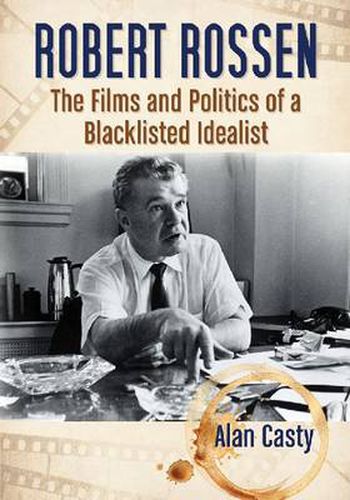Readings Newsletter
Become a Readings Member to make your shopping experience even easier.
Sign in or sign up for free!
You’re not far away from qualifying for FREE standard shipping within Australia
You’ve qualified for FREE standard shipping within Australia
The cart is loading…






This title is printed to order. This book may have been self-published. If so, we cannot guarantee the quality of the content. In the main most books will have gone through the editing process however some may not. We therefore suggest that you be aware of this before ordering this book. If in doubt check either the author or publisher’s details as we are unable to accept any returns unless they are faulty. Please contact us if you have any questions.
The book calls for a re-evaluation, a re-seeing, of the films of Robert Rossen. Over a 30-year period, he was the most accomplished writer and director who was also a long-time member of the Communist Party, but his achievement has not been recognized, his films have been belittled or ignored, his valuable legacy denied. Rossen’s films reflected his times and the American scene with a dramatic intensity and personal expression unmatched by any other filmmaker of the period. The stages of his political journey, from idealism about Communism to his rebellion against the Party’s betrayal of those ideals, influenced the rendering of his concerns and themes–the flaws of human nature, the complexities of motives, the paradoxes of betrayal, personal and political. Yet Rossen testified against his fellow filmmakers, and so his morals and character have been denounced for decades, his work belittled as fatally marred by his moral flaws. The opposite is true. The book presents a thorough analysis of each of his 22 films, and their place in the developing themes of his body of work. It integrates this study of the films with a documented narrative of his relationship to the Party, its history and conflicts, its duplicities–especially the relations of the Party and its followers to the monstrous oppressions of the Soviet Union. And so it challenges the validity of the conventional wisdom about the moral issues of the Blacklist period.
$9.00 standard shipping within Australia
FREE standard shipping within Australia for orders over $100.00
Express & International shipping calculated at checkout
This title is printed to order. This book may have been self-published. If so, we cannot guarantee the quality of the content. In the main most books will have gone through the editing process however some may not. We therefore suggest that you be aware of this before ordering this book. If in doubt check either the author or publisher’s details as we are unable to accept any returns unless they are faulty. Please contact us if you have any questions.
The book calls for a re-evaluation, a re-seeing, of the films of Robert Rossen. Over a 30-year period, he was the most accomplished writer and director who was also a long-time member of the Communist Party, but his achievement has not been recognized, his films have been belittled or ignored, his valuable legacy denied. Rossen’s films reflected his times and the American scene with a dramatic intensity and personal expression unmatched by any other filmmaker of the period. The stages of his political journey, from idealism about Communism to his rebellion against the Party’s betrayal of those ideals, influenced the rendering of his concerns and themes–the flaws of human nature, the complexities of motives, the paradoxes of betrayal, personal and political. Yet Rossen testified against his fellow filmmakers, and so his morals and character have been denounced for decades, his work belittled as fatally marred by his moral flaws. The opposite is true. The book presents a thorough analysis of each of his 22 films, and their place in the developing themes of his body of work. It integrates this study of the films with a documented narrative of his relationship to the Party, its history and conflicts, its duplicities–especially the relations of the Party and its followers to the monstrous oppressions of the Soviet Union. And so it challenges the validity of the conventional wisdom about the moral issues of the Blacklist period.